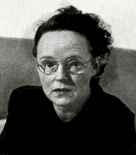Alma
, in Latin, means soul. She was Hitchcock’s first and last Leading Lady…Despite the fascination Hitchcock had for beautiful stars like Grace Kelly, Ingrid Bergman, and Tippi Hedren, there was never any doubt that his true Leading Lady was always Alma, his constant professional collaborator and soulmate.
It was only through the process of writing Hitch&Alma did this writer come to realize the absolutely pivotal role Alma Reville Hitchcock played in the shaping of her husband's work. In fact, Willian Rothman, author of one of the most insightful critical books on the director, Hitchcock, the Murderous Gaze, contends that the Hitchcock marriage is the key to understanding all of his films.
There are at least three portraits of Alma created by Hitchcock within his films. Gay Keane, the wife of the defense attorney Anthony Keane in The Paradine Case, knows her husband is infatuated with his beautiful but guilty client, Mrs. Parradine, yet trusts he will see his way through his misguided obsession.
In his movie, I Confess, the wife of the Church handyman Otto Ketter, also named Alma, must share her husband's guilt over his murder, a crime committed because Otto (much like Hitch himself, inextricably linked to the Church yet on certain levels holding it in contempt) wanted to provide his Alma with a better life, even if it meant violating the Church's laws.
His most poignant and telling tribute to Alma is perhaps the role of Detective Oxford's unnamed wife in Frenzy, who figures out that the anti-hero suspect Richard Blainey couldn't possibly be the "neck tie murderer" way before her husband comes to the same conclusion. Could this be an admission on Hitchcock's part that his cinema owes more to Alma than we know?
Even with all Hitch's phenomenal gifts of visual storytelling and piercing insight into human nature, it was often Alma who assisted him in the finding and development of the literary works that ended up as Hitchcock movies. Under her maiden name Alma Reville, she earned a story credit in no less than sixteen of his films for story adaptation or screenplay collaboration.
Alma and Hitchcock first met while they both worked at the Famous Players-Lasky Studio in London during the early 1920's. They married in December 1926. Alma became his collaborator and sounding board in every sense, with a keen ear for dialogue and an editor's sharp eye for scrutinizing a film's final version for flaws so minor they escaped Hitchcock's own notice, and that of his top notch crew.
Hitchcock once boasted that he would be remembered as an enigma wrapped inside of a riddle. Using irony along with tongue-in-cheek humor as both a public shield and an open window into his soul, Hitchcock the man was soon embraced by audiences everywhere, just as much as his films were. It's safe to say that behind this great man was a very supportive, discreet and persistent woman.
In 1979, Hitchcock was awarded the American Film Institute's Lifetime Achievement Award, which he dedicated to his wife Alma, commenting "without whom I probably would have ended up at this banquet as one of the slower moving waiters."
In 1997, their daughter Patricia Hitchcock O'Connell endowed University of Southern California with the Alma and Alfred Hitchcock Chair, dedicated to the recognition of her mother's important contribution to Hitchcock's cinema. Perhaps Hitch&Alma will offer some salient clues to exploring the supporting role of Alma Reville Hitchcock and her lasting influence on her genius husband.

Here’s part of an ongoing exchange between Hitch and Alma, taken from the book:
In the bathroom, Hitch is looking at himself through a steamed-up mirror, as Alma reads a book while soaking in the tub…
ALMA: Don't think I haven't forgotten about Ingrid.
HITCHCOCK: Oh, please.
ALMA: Could you have made a bigger fool of yourself? I can only imagine what you felt when she finally married that other balding foreign director.
Hitch gravely stares into the mirror, as if it were an oracle.
HITCHCOCK: Alma, things haven't been so bad for us. We travel, we dine in the finest restaurants, we have a lovely daughter. I'm a happily married man.
She stares at his guilty reflection in the fogged mirror.
ALMA: Someone like you can never be happy.

Hitch&Alma
reveals the great adventure shared by two soulmates, the one story Hitchcock never told you about.![]() A reading sample from Hitch&Alma:
A reading sample from Hitch&Alma:
![]() An interview with author of Hitch&Alma, Robert Schoen
An interview with author of Hitch&Alma, Robert Schoen
![]() Did Hitch have a secret collection of Outtakes? Some Photos and Posters:
Did Hitch have a secret collection of Outtakes? Some Photos and Posters:
![]() Hitchcock's Other Leading Ladies:
Hitchcock's Other Leading Ladies:
![]() The Mother in Hitchcock's films:
The Mother in Hitchcock's films:
![]() Hitch & Herrmann, artists with the same obsessive vision:
Hitch & Herrmann, artists with the same obsessive vision:
![]() Reader’s and Web Site Visitor’s Comments:
Reader’s and Web Site Visitor’s Comments:
![]() Book description and how to order a copy of Hitch&Alma:
Book description and how to order a copy of Hitch&Alma:
![]() 1999, Events Celebrating the Hitchcock centennial:
1999, Events Celebrating the Hitchcock centennial:
![]() Links to other Great Hitchcock Web Sites:
Links to other Great Hitchcock Web Sites:
![]()
(About the music on this site: These sound clips are selections from
Bernard Herrmann's great film music. This page plays the Blindness Theme from On Dangerous Ground.)